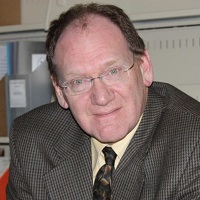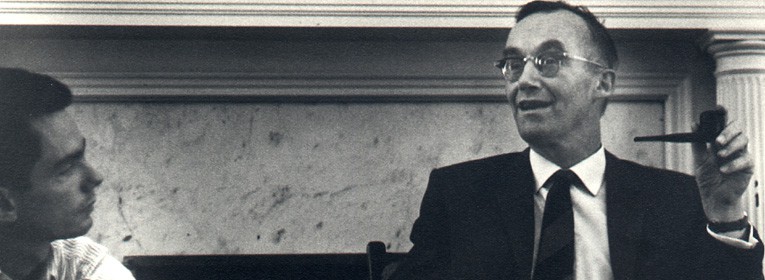
Date
Time
2018 Markus Barth Symposium

Markus Barth (1915–1994) is the former professor of New Testament at the University of Dubuque Theological Seminary, the University of Chicago, Pittsburgh Theological Seminary, and the University of Basel. He made signal and lasting contributions to Pauline scholarship and New Testament theology more generally, and is well known for his particular interest in the questions surrounding justification, baptism and eucharist, and Christian—Jewish relations. He was also, as Dikran Hadidian once put it, a man who chose ‘through his life and scholarship, spoken and written, to break down walls and barriers of race, religion, and color’, in witness to Christ’s own saving demolition of walls of enmity (Eph. 2:14).
Through his vision and initiative, Markus Barth was instrumental in the creation of the Karl Barth Society of North America. His father, Karl Barth, acknowledged the profound personal influence of Markus’ work when he wrote in the introduction to Church Dogmatics IV/4, that ‘without following him closely, without cashing in to a large extent on his work, I could hardly have made the reorientation in my own doctrine of baptism’.
The Center for Barth Studies—which is honored to curate Markus Barth’s literary estate within the archives and special collections of the Princeton Seminary Library—is now delighted to be marking the recent centenary of his birth. It has invited a select group of former students, fellow New Testament scholars, and theologians to contribute to a research symposium with a view to illuminating and celebrating the enduring legacy of his life and work on September 27-29. This three day symposium will explore the following themes in relation to Markus Barth’s legacy: Markus’ contributions to NT studies, the Christian rites of baptism and the Lord’s Supper, and the doctrine of reconciliation (living the “one-ness” of the People of God in Judaism and Christianity).
Registration
The cost of registration for the event is $80.
This fee includes breakfast and lunch on all three days of the event along with refreshments.
Princeton Seminary faculty and students do not have to pay a fee.
Speakers
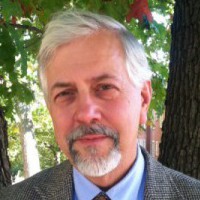 Steve Crocco
Steve Crocco
Steve is the Library Director at Yale Divinity School. His involvement with the Center for Barth Studies at Princeton Seminary predates its founding. Active in the Karl Barth Society of North America (Midwest Chapter) while teaching Christian Ethics at Elmhurst College, Steve learned of plans by Markus Barth and others to form a Karl Barth research center in North America. He used his position as Library Director at Pittsburgh Theological Seminary to visit other research centers and develop the requirements for a center for Barth studies. In 1996, Steve was appointed to the Executive Committee of the KBSNA to identify a suitable home. In 1997, Princeton Seminary’s proposal to host the Barth center was affirmed by the KBSNA Executive Committee and Steve became the James Lenox Librarian at Princeton, a position he held until 2012. Steve hired the Center’s first Director, George Hunsinger, and was actively involved in building bridges between Princeton and the Barth Archive in Basel and Barth’s family, fund raising, and giving shape to the institutional requirements of the Center. Steve’s scholarly interest in Karl Barth lies in the area of Barth’s influence on North American theologians such as Joseph Haroutunian and H. Richard Niebuhr.
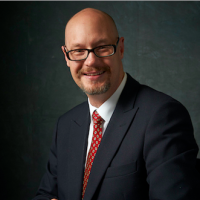 Mark Lindsay
Mark Lindsay
A priest of the Anglican Diocese of Melbourne, Mark Lindsay is the Joan F.W. Munro Professor of Historical Theology, and (Interim) Dean of the Trinity College Theological School. He has taught at universities in Melbourne, Perth and Cambridge, and worked for seven years as the University of Divinity’s Director of Research. Mark is the author of three books on Karl Barth [Covenanted Solidarity: The Theological Basis of Karl Barth’s Opposition to Nazi Antisemitism and the Holocaust, (Peter Lang, 2001); Barth, Israel and Jesus, (Ashgate, 2007); and Reading Auschwitz with Barth: The Holocaust as Problem and Promise for Barthian Theology, (Wipf & Stock, 2014)], and is currently writing a book on the doctrine of election, which will be published by IVP Academic. In the winter of 2016-17, he was a visiting scholar at Princeton Theological Seminary, where he conducted research on the topic ‘Judaism and Israel in the Theology of Markus Barth’.
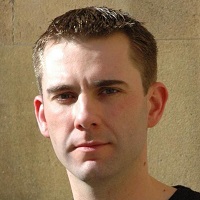 Paul T. Nimmo
Paul T. Nimmo
Paul Nimmo holds the King’s (1620) Chair of Systematic Theology at the University of Aberdeen, having previously held positions at the University of Cambridge and the University of Edinburgh. His studies were undertaken at the University of Cambridge, the University of Edinburgh, Princeton Theological Seminary, and the Eberhard Karls Universität Tübingen. His first monograph, Being in Action: The Theological Shape of Barth’s Ethical Vision, was awarded a John Templeton Award for Theological Promise in 2009, and he has since published Barth: A Guide for the Perplexed, co-edited The Cambridge Companion to Reformed Theology, and edited the church resource Learn: Understanding Our Faith. He served as Managing Editor and then Editor of the International Journal of Systematic Theology for a decade, before becoming its Senior Editor in 2016; he also serves as the current co-Chair of the AAR Reformed Theology and History Group Steering Committee, having been a Member of the same since 2012, and as a member of the AAR Friedrich Schleiermacher Group. He served on the Steering Committee of the Society for the Study of Theology between 2008 and 2011, and as the Society’s Treasurer from 2013 to 2016. He is an ordained elder in the Church of Scotland, and participates in diverse ways in the life of the church, at both local and national levels.
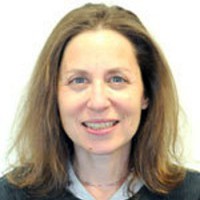 Randi Rashkover
Randi Rashkover
Dr. Randi Rashkover is associate professor of Religious Studies and director of the Judaic Studies Program at George Mason University. She is the author of Revelation and Theopolitics: Barth, Rosenzweig and the Politics of Praise (T&T Clark, 2005) and Freedom and Law: A Jewish-Christian Apologetics (Fordham University Press, 2011). She is editor of many volumes including, (with C.C. Pecknold) Liturgy Time and the Politics of Redemption (Wm.B. Eerdmans, 2006) and (with Martin Kavka) Tradition in the Public Square: A Novak Reader (Wm. B. Eerdmans, 2007) and (with Martin Kavka) Judaism, Liberalism and Political Theology (Indiana University Press, 2014). Her current monograph project, Nature and Norm: Judaism, Christianity and the Theologico-Political Problem concerns the impact of the fact-value divide on modern and contemporary Jewish and Christian thought. Dr. Rashkover is a Senior Editor (along with Stanley Hauerwas, Peter Ochs and Maria Dakake) of the Encountering Traditions book series at Stanford University Press.
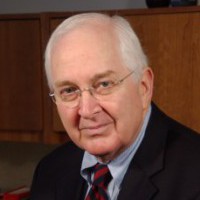 Joseph Small
Joseph Small
Joseph D. Small served as director of the Presbyterian Church (U.S.A.) Office of Theology and Worship from 1989-2011. He is now adjunct faculty at the University of Dubuque Theological Seminary, and church relations consultant to the Presbyterian Foundation. He serves on the boards of the Center for Catholic and Evangelical Theology, the Institute for Church Renewal, and Innovative Space for Asian American Christianity. He served as co-chair of the second and third rounds of the international Reformed-Pentecostal Dialogue, and has participated regularly in international ecumenical consultations sponsored by the World Council of Churches, the World Communion of Reformed Churches, and the Centre International Reformé in Geneva.
Dr. Small holds degrees from Brown University, Pittsburgh Theological Seminary, Princeton Theological Seminary, and Louisville Theological Seminary. He has served on the staff of Pittsburgh Seminary, and as pastor of churches in Towson Maryland, Westerville Ohio, and Rochester New York. Dr. Small is the author of Flawed Church, Faithful God (2018), To Be Reformed: Living the Tradition (2010), Let Us Reason Together: Christians and Jews in Conversation (2010), Proclaiming the Great Ends of the Church (2010), Conversations with the Confessions (2005), Preservation of the Truth (2005), Fire and Wind: The Holy Spirit in the Church Today (2002), Committed Conversation (2000), and God and Ourselves: A Brief Exercise in Reformed Theology (1997). He has also written numerous monographs, book chapters, journal articles, study series, and theological papers.
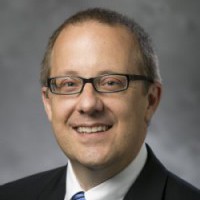 J. Ross Wagner
J. Ross Wagner
J. Ross Wagner is Associate Professor of New Testament at Duke Divinity School. Specializing in Paul’s letters and in Septuagint studies, he seeks to contribute to the recovery of theological exegesis through careful investigation of the waysnscriptural interpretation shaped early Jewish and Christian communities. His publications include Heralds of the Good News: Paul and Isaiah in Concert in the Letter to the Romans (2002), Between Gospel and Election: Explorations in the Interpretation of Romans 9–11 (coedited with Florian Wilk, 2010), and Reading the Sealed Book: Old Greek Isaiah and the Problem of Septuagint Hermeneutics (2013). A member of the editorial boards of Wissenschaftliche Untersuchungen zum Neuen Testament, Themes in Biblical Narrative, The Journal of Septuagint and Cognate Studies, and The Journal of Theological Interpretation, Ross also served for many years on the steering committee for the Pauline Soteriology Group of the Society of Biblical Literature. He was a Humboldt Research Fellow at the University of Göttingen in 2006–2007, 2010, and 2015, and he spent 2009–2010 as a member in residence at the Center of Theological Inquiry in Princeton, New Jersey. Before moving to Duke in 2013, he served for fifteen years as a member of the faculty of Princeton Theological Seminary. Ross serves as an ordained minister in the North Carolina Conference of the United Methodist Church.
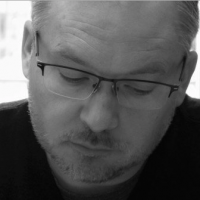 Philip Ziegler
Philip Ziegler
Philip Ziegler is Professor of Christian Dogmatics at the University of Aberdeen. Educated at the Royal Military College of Canada, the University of Toronto, the University of St Michael’s College, Regis College, and Emmanuel College of Victoria University, his studies is systematic and historical theology, ecumenics, and the philosophy of religion culminated in a Postdoctoral Research Fellowship at Princeton University’s Center for the Study of Religion. After teaching for several year at the Atlantic School of Theology in Halifax, Canada, he joined the faculty of the University of Aberdeen in Divinity & Religious Studies in 2006. He is the author of Doing Theology When God is Forgotten: The Theological Achievement of Wolf Krötke (2007) and Militant Grace: The Apocalyptic Turn and the Future of Christian Theology (2018). He has edited and co-edited a number of works in including The Providence of God, Explorations in Christian Theology and Ethics: Essays in Conversation with Paul L. Lehmann, Christ, Church and World: New Studies in Bonhoeffer’s Theology and Ethics, and Eternal God, Eternal Life: Theological Investigations into the Concept of Immortality. Phil is an Associate Editor of the Journal of Reformed Theology and also serves, together with Ian MacFarland and Ivor Davidson, as series editor of T&T Clark Studies in Systematic Theology. Phil is a General Secretary of the Karl Barth Society of North America, and serves on the executive committee of the English language section of the International Bonhoeffer Society and the steering group of the ‘Bonhoeffer and Social Analysis’ section of the AAR. An ordained minister of the United Church of Canada, Phil is formally associated with the Kirk Session of the Cathedral Church of St. Machar in Aberdeen.
Schedule
Wednesday, September 26th
4:00-6:30 PM – Registration – Theron Room, Library
Thursday, September 27th
7:30-8:00 AM – Registration – Theron Room, Library
8:00-9:00 AM – Breakfast – Mackay Dining Hall
9:00 – 10:00 AM – Speaker 1 – David MacLachlan – “Like Son, like Father? Did Markus influence Karl’s thinking on baptism?” – Theron Room, Library
10:00 – 10:30 AM –Break (coffee and refreshments outside Theron Room)
10:30 – 11:30 AM – Speaker 2 – Ross Wagner – “The Drama of Justification: Markus Barth’s Rechtfertigung” – Theron Room, Library
12:00 – 1:00 PM – Lunch – Mackay Dining Hall
1:30 – 2:30 PM – Speaker 3 – Paul Nimmo – “Markus Barth on the Lord’s Supper – An Ecumenical Dissenter” – Theron Room, Library
2:30 – 7:30 PM –Break (coffee and refreshments outside Theron Room)
7:30 – 9:00 PM – After dinner talk – Joseph Small – “The World of the Bible: Always Strange, Eternally New. Markus Barth as Teacher” – Theron Room, Library
Friday, September 28th
8:00-9:00 AM – Breakfast – Mackay Dining Hall
9:00-10:00 AM – Speaker 4 – Randi Rashkover – “Markus Barth’s Theology of Jewish-Christian Dialogue: A Pragmatic Review” – Theron Room, Library
10:00-10:30 AM –Break (coffee and refreshments outside Theron Room)
10:30-11:30 AM – Speaker 5 – Philip Ziegler – “Peace Through the Cross: the Salvation of Jews and Gentiles” – Theron Room, Library
12:00-1:00 PM – Lunch – Mackay Dining Hall
1:30-2:30 PM – Speaker 6 – Mark Lindsay – “Jewish-Christian Relations from the Underside: Markus Barth’s Correspondence with Michael Wyschogrod and Emil Fackenheim, 1962-1984” – Theron Room, Library
2:30 – 7:30 PM – Break (coffee and refreshments outside Theron Room)
7:30-9:00 PM – After dinner talk – Stephen Crocco – Theron Room, Library
Saturday, September 29th
8:00 – 9:00 – Continental Breakfast, Lobby of the Erdman Campus Center
9:30 – 11:00 – Closing Remarks – Theron Room, Library
12:00 – 1:00 – Lunch – Mackay Dining Hall
Call for Applications
Lodging
Lodging will be available again this year at Princeton Seminary’s Erdman Center. Details about the Erdman Center can be found here. The nightly lodging rates range from $55-$90 depending upon the room you choose. All charges for lodging at the Erdman Center are paid upon arrival at the Erdman Center.
Maps & Directions
By Air
From Newark Liberty International Airport
The Olympic Airporter shuttle service takes you to the Nassau Inn in Princeton; call for schedule and reservations: 800.822.9797 (within the United States) or 732.938.6666 (outside the United States), or visit www.olympicairporter.com
The AirTrain takes you from all airport terminals to the Newark Liberty International Airport Train Station. Take New Jersey Transit southbound (Northeast Corridor Line) trains to Princeton Junction. From Princeton Junction take the train to Princeton Station.
From Philadelphia International Airport
Take the R1 High Speed Rail Line (entrance on pedestrian bridges and commercial roadway), limousine service (The Olympic Airporter; call for reservations: 800.822.9797 within the United States or 732.938.6666 outside the United States, or visit www.olympicairporter.com), or local taxi service to 30th Street Station in Philadelphia, where you can purchase a SEPTA/New Jersey Transit ticket to take a SEPTA train to Trenton and a New Jersey Transit train to Princeton Junction. From Princeton Junction take the train to Princeton Station.
By Bus
From Port Authority Bus Terminal in New York City (41st Street and 8th Avenue)
Purchase a Suburban Transit bus ticket to Princeton at windows 16 through 19 on the first floor. Board the bus on the third floor (fourth level) at gates 420 through 422. The bus leaves every half hour between 6:00 a.m. and 11:00 p.m. on weekdays and between 9:00 a.m. and 11:00 p.m. on weekends, and every half hour on the hour until 1:00 a.m. The trip is one and one-half hours. Ask the driver to let you off at the end of Nassau Street where it meets Mercer Street and Route 206 in Princeton, and walk to the Seminary.
By Train
From New York City (and north) and Philadelphia (and south)
New Jersey Transit services Princeton from the north (New York City, Newark), with connecting service from the south (Trenton, Philadelphia, Baltimore, Washington DC). Amtrak trains stop in Trenton, and some at Princeton Junction.
By Car
From the North/New York City
Take the New Jersey Turnpike South to Exit 9 (New Brunswick). After the tollbooths, bear right onto the ramp for Route 18 North. Shortly after getting onto Route 18 North the road will fork; stay to the left of the fork, in the right lane. Bear right onto this exit for Route 1 South/Trenton. Follow Route 1 South to Alexander Road (Princeton). Turn right onto Alexander Road and continue to the entrance of Princeton Seminary, which is the first left turn after College Road (Alexander Road will be Alexander Street at this point).
From the West
Take I-78 East into New Jersey. Exit onto I-287 South toward Somerville. Follow signs for Routes 202/206 South. Travel south on 202 for a short distance and then follow signs for Route 206 South. You will go around a traffic circle. Continue south on Route 206 for about eighteen miles to Nassau Street (Route 27) in the center of Princeton. Turn left onto Nassau Street and the first right onto Mercer Street and continue to the main entrance of Princeton Seminary, which will be on your left.
From the South
From southern New Jersey take I-295 North (becomes I-95 South) to the “Princeton Pike North” exit and continue on Princeton Pike for approximately five miles. Immediately after passing Library Place (on the left), the main entrance to the campus will be on your right.
From the East
Take I-95 West toward Trenton to the exit for I-295 North (becomes I-95 South) to the “Princeton Pike North” exit and continue on Princeton Pike for approximately five miles. Immediately after passing Library Place (on the left), the main entrance to the campus will be on your right.
From Philadelphia
Take I-95 North into New Jersey and exit at “Princeton Pike North” and continue on Princeton Pike for approximately five miles. Immediately after passing Library Place (on the left), the main entrance to the campus will be on your right.
Contact
If you have any questions or concerns, email us at barth.center@ptsem.edu or call us at 609-524-1981.
Please allow at least three business days for an email response.

